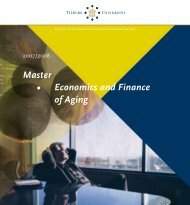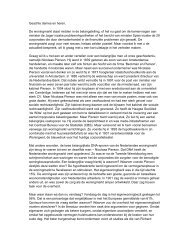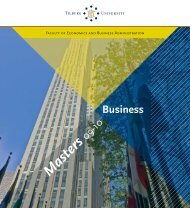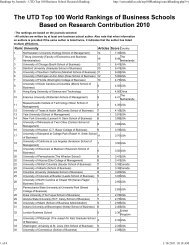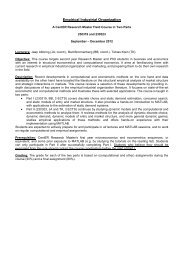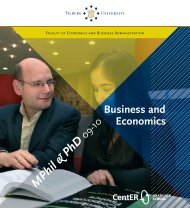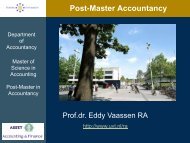Predicting the past - Tilburg University, The Netherlands
Predicting the past - Tilburg University, The Netherlands
Predicting the past - Tilburg University, The Netherlands
You also want an ePaper? Increase the reach of your titles
YUMPU automatically turns print PDFs into web optimized ePapers that Google loves.
Aggregation<br />
Before London, from 1979–1981, Eveline and I lived in Canada, where I worked at <strong>the</strong><br />
<strong>University</strong> of British Columbia and Eveline obtained a masters in Communication Studies<br />
at Simon Fraser <strong>University</strong>, completing her degree with a <strong>the</strong>sis later published by<br />
Cambridge <strong>University</strong> Press under <strong>the</strong> title <strong>The</strong> Bilingual Experience. We moved to Canada<br />
with one child and left two years later with two.<br />
At UBC I became interested in aggregation, possibly inspired by <strong>the</strong> growth in my family,<br />
and by Alan Woodland, a leading expert on aggregation, who was <strong>the</strong>n also working at<br />
UBC. Alan and I worked toge<strong>the</strong>r primarily on <strong>the</strong> following question. Suppose we wish to<br />
estimate or forecast something at <strong>the</strong> macro level, say <strong>the</strong> growth of a national economy.<br />
Underlying <strong>the</strong> macro economy are sectors, which toge<strong>the</strong>r make up <strong>the</strong> macro economy.<br />
Since we wish to say something about <strong>the</strong> macro economy we could work at <strong>the</strong> macro<br />
level, that is <strong>the</strong> national level, only. But we could also model <strong>the</strong> underlying sectors (<strong>the</strong><br />
micro level), using a much bigger and richer data set. <strong>The</strong> question <strong>the</strong>n is: how much do<br />
we learn from this additional information. Is it worth <strong>the</strong> trouble?<br />
At that point, I had moved to <strong>the</strong> London School of Economics and Alan had been<br />
appointed to a chair in Sydney. To make some progress, he kindly invited me for a threeweek<br />
visit. I took <strong>the</strong> cheapest possible flight, spent two nights in <strong>the</strong> air, and arrived<br />
exhausted in Sydney. But <strong>the</strong> three weeks were highly enjoyable and very productive.<br />
<strong>The</strong> answer to our question is that we don’t learn that much from <strong>the</strong> additional<br />
information. In fact, it may be counterproductive. How can that be? Is it not true that <strong>the</strong><br />
more data <strong>the</strong> better? Well, yes and no. More data are preferred over fewer data, but we<br />
also need to model <strong>the</strong>se underlying sectors and specify how <strong>the</strong>y make up <strong>the</strong> national<br />
economy. In this process we cannot avoid making modeling and specification errors, and<br />
<strong>the</strong> harm caused by <strong>the</strong>se errors may be greater than <strong>the</strong> advantage of <strong>the</strong> richer data set.<br />
More detail is not necessarily a good thing, a somewhat counterintuitive and <strong>the</strong>refore<br />
appealing idea, which I took up again in working with Jan van Tongeren on national<br />
accounts data, many years later.<br />
<strong>Predicting</strong> <strong>the</strong> <strong>past</strong> 9



